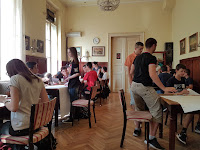Since I love following my student's fb page Friends learning Serbian, I have to publish this sheet that I usually use with my students. One of the members of this interactive group wanted to know more about this part of vocabulary. And he asked about all the relatives that are really, really important in Serbia, such as SESTRA OD TETKE, BRAT OD UJAKA and so on. If you want to learn more, continue reading.
MY FAMILY - МОЈА ПОРОДИЦА
Family members
mom - мама/mama
my mom - моја мама/ moja mama
dad - тата/ tata
my dad - мој тата/ moj tata
child - children - дете/деца// dete/deca
my child - моје дете/ moje dete
my children - моја деца/ moja deca
son - син/ sin
my son - мој син/ moj sin
daughter - ћерка/ ćerka
my daughter - моја ћерка/ moja ćerka
wife - жена/супруга // žena/supruga
my wife - моја жена/супруга // moja žena/supruga
husband - муж/супруг // muž/suprug
my husband - мој муж/супруг // moj muž/moj suprug
brother - брат/ brat
younger brother - млађи брат/ mlađi brat
older brother - старији брат/ stariji brat
sister - сестра / sestra
younger sister - млађа сестра/ mlađa sestra
older sister - старија сестра / starija sestra
grandma - баба/бака //baba/baka
grandpa - деда/дека //deda/deka
parent(s) - родитељ(и) // roditelj(i)
my parents - моји родитељи // moji roditelji
grandparent(s) - баба и деда // baba i deda
my grandparents - moji baba i deda
aunt - тетка, стрина, ујна // tetka, strina, ujna
Teтка - mother’s or father’s sister
Стрина - relative by marriage (married to STRIC)
Ујна - relative by marriage (married to UJAK)
uncle - теча, стриц, ујак// teča, stric, ujak
Теча - relative by marriage (married to TETKA)
Стриц - father’s brother
Ујак - mother’s brother
cousin - брат од тетке, сестра од ујака… // brat od tetke, sestra od ujaka (stric, ujak, tetka)
This is my family. - Ово је моја породица. / Ovo je moja porodica.
Is this your family? - Да ли је ово твоја породица?/ Da li je ovo tvoja porodica?
Where does your family live? - Где твоја породица живи?/ Gde tvoja porodica živi?
My family is big/small. - Моја породица је велика/мала./ Moja porodica je velika/mala.
**Now that you know all the words, here is a short text to try to read and after it you may try to write about your family or try to tell your teacher more about it.
Ovo je moja porodica. Ona je velika. Moja porodica živi u Srbiji.
Ja sam Miloš, a moj mlađi brat se zove Luka. Luka nema ženu, ali ima tri deteta. To su mlađi sin Nikola, ćerka Ana i stariji sin Milan. Moja Ena i moja Olja su njima sestre od strica.
Ovo je moja žena Maja. Ona ima trideset i pet (35) godina i radi kao nastavnica u školi. Ovo su naša deca - starija ćerka Olja i mlađa ćerka Ena. Olja ima tri (3) godine, a Ena jednu (1).
Na slici se nalaze i moji roditelji Marko i Nataša. Oni su penzioneri.
Ja volim svoju porodicu.








